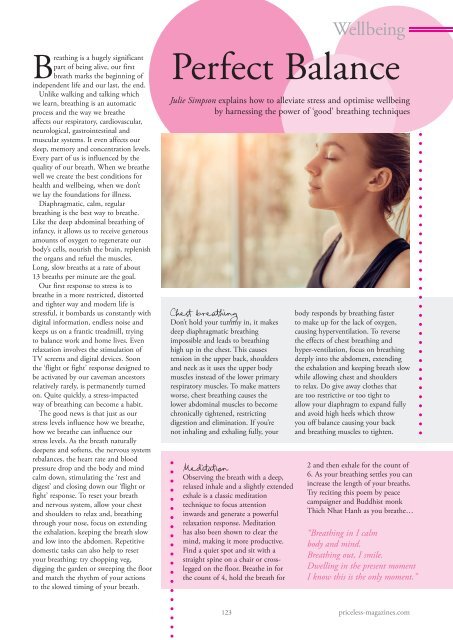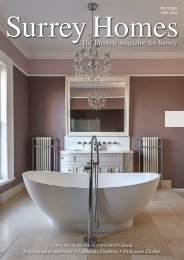Wealden Times | WT224 | Nov & Dec 2020 | Christmas supplement inside
Wealden Times - The lifestyle magazine for the Weald
Wealden Times - The lifestyle magazine for the Weald
Create successful ePaper yourself
Turn your PDF publications into a flip-book with our unique Google optimized e-Paper software.
Wellbeing<br />
Breathing is a hugely significant<br />
part of being alive, our first<br />
breath marks the beginning of<br />
independent life and our last, the end.<br />
Unlike walking and talking which<br />
we learn, breathing is an automatic<br />
process and the way we breathe<br />
affects our respiratory, cardiovascular,<br />
neurological, gastrointestinal and<br />
muscular systems. It even affects our<br />
sleep, memory and concentration levels.<br />
Every part of us is influenced by the<br />
quality of our breath. When we breathe<br />
well we create the best conditions for<br />
health and wellbeing, when we don’t<br />
we lay the foundations for illness.<br />
Diaphragmatic, calm, regular<br />
breathing is the best way to breathe.<br />
Like the deep abdominal breathing of<br />
infancy, it allows us to receive generous<br />
amounts of oxygen to regenerate our<br />
body’s cells, nourish the brain, replenish<br />
the organs and refuel the muscles.<br />
Long, slow breaths at a rate of about<br />
13 breaths per minute are the goal.<br />
Our first response to stress is to<br />
breathe in a more restricted, distorted<br />
and tighter way and modern life is<br />
stressful, it bombards us constantly with<br />
digital information, endless noise and<br />
keeps us on a frantic treadmill, trying<br />
to balance work and home lives. Even<br />
relaxation involves the stimulation of<br />
TV screens and digital devices. Soon<br />
the ‘flight or fight’ response designed to<br />
be activated by our caveman ancestors<br />
relatively rarely, is permanently turned<br />
on. Quite quickly, a stress-impacted<br />
way of breathing can become a habit.<br />
The good news is that just as our<br />
stress levels influence how we breathe,<br />
how we breathe can influence our<br />
stress levels. As the breath naturally<br />
deepens and softens, the nervous system<br />
rebalances, the heart rate and blood<br />
pressure drop and the body and mind<br />
calm down, stimulating the ‘rest and<br />
digest’ and closing down our ‘flight or<br />
fight’ response. To reset your breath<br />
and nervous system, allow your chest<br />
and shoulders to relax and, breathing<br />
through your nose, focus on extending<br />
the exhalation, keeping the breath slow<br />
and low into the abdomen. Repetitive<br />
domestic tasks can also help to reset<br />
your breathing: try chopping veg,<br />
digging the garden or sweeping the floor<br />
and match the rhythm of your actions<br />
to the slowed timing of your breath.<br />
Perfect Balance<br />
Julie Simpson explains how to alleviate stress and optimise wellbeing<br />
by harnessing the power of ‘good’ breathing techniques<br />
Chest breathing<br />
Don’t hold your tummy in, it makes<br />
deep diaphragmatic breathing<br />
impossible and leads to breathing<br />
high up in the chest. This causes<br />
tension in the upper back, shoulders<br />
and neck as it uses the upper body<br />
muscles instead of the lower primary<br />
respiratory muscles. To make matters<br />
worse, chest breathing causes the<br />
lower abdominal muscles to become<br />
chronically tightened, restricting<br />
digestion and elimination. If you’re<br />
not inhaling and exhaling fully, your<br />
Meditation<br />
Observing the breath with a deep,<br />
relaxed inhale and a slightly extended<br />
exhale is a classic meditation<br />
technique to focus attention<br />
inwards and generate a powerful<br />
relaxation response. Meditation<br />
has also been shown to clear the<br />
mind, making it more productive.<br />
Find a quiet spot and sit with a<br />
straight spine on a chair or crosslegged<br />
on the floor. Breathe in for<br />
the count of 4, hold the breath for<br />
body responds by breathing faster<br />
to make up for the lack of oxygen,<br />
causing hyperventilation. To reverse<br />
the effects of chest breathing and<br />
hyper-ventilation, focus on breathing<br />
deeply into the abdomen, extending<br />
the exhalation and keeping breath slow<br />
while allowing chest and shoulders<br />
to relax. Do give away clothes that<br />
are too restrictive or too tight to<br />
allow your diaphragm to expand fully<br />
and avoid high heels which throw<br />
you off balance causing your back<br />
and breathing muscles to tighten.<br />
2 and then exhale for the count of<br />
6. As your breathing settles you can<br />
increase the length of your breaths.<br />
Try reciting this poem by peace<br />
campaigner and Buddhist monk<br />
Thich Nhat Hanh as you breathe…<br />
“Breathing in I calm<br />
body and mind.<br />
Breathing out, I smile.<br />
Dwelling in the present moment<br />
I know this is the only moment.”<br />
123 priceless-magazines.com


















